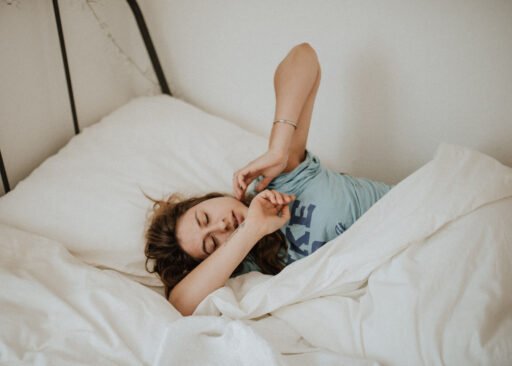Imagine waking up to the sun streaming through the curtains, a new day stretching out before you. But instead of feeling energized and ready to seize the day, you are greeted with a knot in your stomach, a racing heart, and an overwhelming sense of unease. It’s a phenomenon that many can relate to: anxiety in the morning. You may wonder why this happens, and how you can overcome it. In this article “Why Anxiety In The Morning”, we will explore the reasons behind morning anxiety and provide practical tips to help alleviate its grip on your mornings, allowing you to start your day with a sense of calm and clarity.
Understanding Anxiety
Anxiety is a common and natural response to stress, characterized by feelings of unease, fear, and worry. It is a normal part of life and can sometimes serve as a motivator or a protective mechanism. However, when anxiety becomes excessive, persistent, and interferes with daily functioning, it may be a sign of an anxiety disorder.
Definition of anxiety
Anxiety is an emotional and physiological response to perceived threats or challenges. It involves a range of symptoms, including excessive worrying, restlessness, irritability, difficulty concentrating, muscle tension, and sleep disturbances. Anxiety can manifest in various forms, such as generalized anxiety disorder (GAD), panic disorder, social anxiety disorder, and specific phobias.
Causes of anxiety
Anxiety can be caused by a combination of factors, including genetics, brain chemistry, personality traits, and life experiences. Some individuals may be more biologically predisposed to anxiety, while others may develop it as a result of traumatic or stressful events, such as a loss, major life transitions, or chronic illness. Additionally, certain medical conditions, substance abuse, and side effects of medications can also contribute to the development of anxiety disorders.
Symptoms of anxiety
The symptoms of anxiety can vary widely from person to person, but common manifestations include feelings of restlessness, irritability, or being on edge. Physical symptoms may include rapid heartbeat, shortness of breath, sweating, trembling, and gastrointestinal distress. Cognitive symptoms can involve excessive worrying, racing thoughts, difficulty concentrating, and anticipating the worst outcome. Behavioral symptoms may include avoidance of certain situations or activities, seeking reassurance, and engaging in repetitive behaviors.
The Morning Anxiety Phenomenon
What is morning anxiety?
Morning anxiety refers to feelings of anxiety or distress that are most prominent upon awakening or shortly after waking up. Many individuals experience a spike in anxiety levels during the morning hours, which can make it challenging to start the day on a positive note. The exact reasons behind the morning anxiety phenomenon are not fully understood, but several factors may contribute to its occurrence.
Prevalence of Why Anxiety In The Morning
Morning anxiety is a relatively common experience, with many individuals reporting feeling more anxious or agitated in the early hours of the day. It can affect people of all ages and backgrounds, and its prevalence tends to vary depending on individual circumstances and ongoing stressors. Morning anxiety can be a standalone issue or occur alongside other anxiety disorders.
Difference between morning anxiety and general anxiety
While morning anxiety may be a symptom of a general anxiety disorder, it is important to differentiate between the two. General anxiety refers to chronic and persistent anxiety that can occur at any time throughout the day and is not specifically limited to the morning hours. Morning anxiety, on the other hand, typically presents as a temporary and intense spike in anxiety levels upon waking up.

Biological Factors Influencing Morning Anxiety
Cortisol levels and their role
One of the key biological factors that can contribute to morning anxiety is the hormone cortisol. Cortisol is often referred to as the “stress hormone” as it is released in response to stress and plays a role in regulating the body’s stress response. Cortisol levels naturally fluctuate throughout the day, with higher concentrations typically observed in the morning. This increase in cortisol levels upon awakening can contribute to a heightened state of anxiety.
Sleep patterns and their impact
Sleep patterns and the quality of sleep can also influence morning anxiety. Disrupted or insufficient sleep can lead to increased feelings of stress and anxiety upon waking up. Lack of quality sleep can interfere with the body’s natural regulatory processes, including the release of hormones and neurotransmitters that help regulate mood and emotions.
Hormonal changes during sleep
During sleep, there are various hormonal changes that occur in the body. These changes can impact mood and anxiety levels upon waking up. For example, fluctuations in serotonin, a neurotransmitter involved in mood regulation, may contribute to increased anxiety in the morning. Additionally, hormonal imbalances, such as those related to the menstrual cycle or menopause, can also play a role in the experience of morning anxiety for some individuals.
Psychological Factors Contributing to Morning Anxiety
Dreaming and its effects
Dreaming during sleep is a normal and essential process for our mental well-being. However, certain types of dreams, such as nightmares or vivid and distressing dreams, can contribute to morning anxiety. When we wake up from a particularly intense dream, the residual emotions and images can linger, leading to heightened anxiety upon awakening.
Worrying about the day ahead
Anticipation and worry about the day ahead can also contribute to morning anxiety. The responsibilities, tasks, and challenges that await can trigger feelings of stress and anxiety, especially if one feels overwhelmed or lacks confidence in their ability to cope with the demands of the day. This anticipation can further exacerbate morning anxiety symptoms.
Negative thought patterns
Negative thought patterns, such as catastrophic thinking or excessive self-criticism, can fuel morning anxiety. When our minds are flooded with negative thoughts and worries upon waking up, it can set the tone for the rest of the day, intensifying anxiety symptoms. Cognitive-behavioral therapy (CBT) techniques can be helpful in identifying and challenging these negative thinking patterns.

Environmental Triggers of Morning Anxiety
Work-related stressors
Work-related stress can be a significant trigger for morning anxiety. The pressure to perform, meet deadlines, and navigate interpersonal dynamics at work can lead to increased anxiety levels upon waking up. Additionally, unresolved work-related issues or conflicts can linger in the mind during sleep and contribute to morning anxiety.
Family or relationship issues
Difficulties within family or personal relationships can also contribute to morning anxiety. Unresolved conflicts, communication issues, or concerns about the well-being of loved ones can weigh heavily on one’s mind and give rise to anxiety upon awakening. It is important to address and seek support for these relationship issues to alleviate morning anxiety.
Financial concerns
Financial worries can be a significant source of anxiety, and these concerns can be particularly overwhelming in the morning. Thoughts about bills, debts, job security, or financial instability can trigger anxiety symptoms upon waking up. Seeking financial assistance or consulting a financial advisor can help alleviate some of these concerns and reduce morning anxiety.
Tips for Managing Morning Anxiety
Establishing a morning routine
Creating a structured and calming morning routine can help reduce morning anxiety. Incorporate activities that promote relaxation and set a positive tone for the day, such as gentle stretching, practicing mindfulness or meditation, enjoying a nutritious breakfast, and engaging in activities that bring joy.
Incorporating relaxation techniques
Implementing relaxation techniques into your morning routine can help alleviate anxiety symptoms. Deep breathing exercises, progressive muscle relaxation, and guided imagery can all be effective tools for managing morning anxiety. These techniques can help calm the mind, reduce tension, and promote a sense of peace and well-being.
Challenging negative thoughts
Cognitive-behavioral techniques can be powerful in managing morning anxiety by challenging negative thought patterns. Practice identifying and reframing distorted thoughts and replacing them with more realistic and positive alternatives. Remember that your thoughts do not define your reality, and actively challenging them can lead to a more balanced and grounded perspective.

Seeking Professional Help
When to consider therapy or counseling
If morning anxiety persists and significantly interferes with your daily life, it may be beneficial to seek professional help. Consider therapy or counseling if morning anxiety is becoming increasingly distressing, impacting your relationships or work performance, or causing significant emotional distress. A mental health professional can provide guidance, support, and evidence-based interventions to help manage and overcome morning anxiety.
Different forms of therapy available
Various therapeutic approaches can be effective in addressing morning anxiety. Cognitive-behavioral therapy (CBT) is commonly utilized and focuses on identifying and challenging negative thought patterns and implementing coping strategies. Other types of therapy, such as mindfulness-based therapies, psychodynamic therapy, or acceptance and commitment therapy (ACT), may also be helpful depending on individual needs and preferences.
Medication options for anxiety
In some cases, medication may be prescribed alongside therapy to help manage morning anxiety. Antidepressants or anti-anxiety medications can be effective in reducing anxiety symptoms and promoting a greater sense of well-being. It is important to consult with a healthcare professional to determine the appropriate medication and dosage for your specific needs.
Self-Care Strategies for Anxiety Management
Regular exercise and its benefits
Engaging in regular physical exercise has been shown to be an effective strategy for managing anxiety. Exercise releases endorphins, which are natural mood elevators and can help reduce anxiety symptoms. Find activities that you enjoy, such as walking, yoga, dancing, or swimming, and incorporate them into your daily routine to promote physical and mental well-being.
Balanced and nutritious diet
A balanced and nutritious diet can play a role in managing morning anxiety. Foods that are high in sugar or caffeine can exacerbate anxiety symptoms, so it is important to limit their consumption. Instead, focus on consuming a diet rich in fruits, vegetables, lean proteins, whole grains, and healthy fats, as these can support overall mental and physical wellness.
Improving sleep hygiene
Optimal sleep hygiene can significantly impact morning anxiety. Establishing a consistent sleep schedule, creating a relaxing bedtime routine, and ensuring a comfortable sleep environment can promote restful sleep and reduce anxiety upon waking. Minimize exposure to electronic devices close to bedtime, as the blue light emitted can interfere with the body’s natural sleep-wake cycle.
Supportive Resources for Morning Anxiety
Support groups
Joining a support group can provide a valuable source of support and understanding for individuals experiencing morning anxiety. Interacting with others who share similar experiences can provide a sense of validation, connection, and the opportunity to learn coping strategies from those who have successfully managed their morning anxiety.
Online communities and forums
Online communities and forums dedicated to anxiety and mental health can be a helpful resource for individuals seeking support and information about managing morning anxiety. These platforms offer a space to connect with others, share experiences, ask questions, and access a wealth of self-help tools and resources.
Books and self-help resources
There are numerous books and self-help resources available that specifically address anxiety and provide strategies for managing morning anxiety. Reading about others’ experiences, learning about effective coping techniques, and gaining insight into the nature of anxiety can be empowering and beneficial on the journey toward managing morning anxiety.
Conclusion: Why Anxiety In The Morning
Recognizing the importance of addressing morning anxiety is the first step toward achieving optimal mental well-being. Understanding the factors that contribute to morning anxiety, such as biological, psychological, and environmental influences, can help individuals develop effective strategies for managing their symptoms. By implementing self-care practices, seeking professional help when needed, and connecting with supportive resources, individuals can take proactive steps toward reducing morning anxiety and cultivating a sense of calm, resilience, and joy in their everyday lives.
Frequently Asked Questions:
- How can I stop morning anxiety? Stopping morning anxiety involves creating a calming morning routine, practicing mindfulness, and addressing any stressors. Consistency and self-compassion are crucial.
- Why do I feel anxiety when I wake up? Morning anxiety can result from a combination of hormonal fluctuations, unresolved stress from the previous day, or underlying anxiety disorders. Identifying triggers and implementing coping strategies can help.
- How do you deal with anxiety that wakes you up? Dealing with anxiety that wakes you up involves grounding techniques, deep breathing, and creating a sleep-friendly environment. Addressing the root causes with professional support is important.
- How do you deal with morning cortisol? Managing morning cortisol involves maintaining a consistent sleep schedule, engaging in relaxation techniques, and adopting stress-management strategies. Establishing a healthy lifestyle contributes to balanced cortisol levels.
- Is morning anxiety serious? While morning anxiety is common, persistent and severe cases may require professional attention. Consulting with a mental health professional can provide insights and appropriate interventions.
- What is the 3 3 3 rule for anxiety? The 3-3-3 rule involves acknowledging three things you see, hear, and feel during an anxiety episode. This grounding technique helps shift focus away from anxious thoughts and promotes a sense of calmness.
- Does anxiety ever go away? While complete elimination may be rare, many individuals experience significant relief and improved management of anxiety with the right support, therapy, and coping mechanisms.
- Why do I feel terrible in the morning? Feeling terrible in the morning can be influenced by factors like poor sleep quality, stressors, or underlying health conditions. Addressing these factors with professional guidance can lead to improvements.
- Can magnesium help reduce anxiety? Magnesium supplementation may contribute to anxiety reduction, as it plays a role in neurotransmitter regulation. However, it’s essential to consult with a healthcare professional before starting any supplement regimen.
- Why is my anxiety getting worse? Worsening anxiety may be influenced by various factors, including increased stressors or unaddressed triggers. Seeking professional support to explore and manage these factors is important.
- Why do I wake up at 3 am with anxiety? Waking up at 3 am with anxiety may be linked to stressors, hormonal fluctuations, or an underlying sleep disorder. Implementing relaxation techniques and addressing stressors can improve sleep quality.
- What does high cortisol feel like? High cortisol levels may contribute to feelings of restlessness, anxiety, and difficulty relaxing. Balancing cortisol through lifestyle changes and stress management can alleviate these symptoms.
- What foods lower cortisol in the morning? Foods that may help lower morning cortisol include whole grains, lean proteins, and foods rich in omega-3 fatty acids. However, individual responses vary, and it’s advisable to maintain a balanced diet.
- Why is my morning cortisol so high? Elevated morning cortisol can result from factors like chronic stress, poor sleep, or certain medical conditions. Consulting with a healthcare professional can help identify the root causes.
- What time of day is anxiety the worst? The timing of heightened anxiety varies among individuals. Some may experience it more intensely in the morning or evening, while others may notice it during specific stressors.
- When is anxiety not normal? Anxiety becomes concerning when it significantly interferes with daily life, persists over an extended period, or causes distress. Seeking professional guidance is crucial in such cases.
- What can trigger anxiety? Anxiety can be triggered by various factors, including stress, trauma, genetic predisposition, or life changes. Identifying triggers and developing coping strategies are essential for effective management.
- What is anxiety telling you? Anxiety may be signaling underlying stressors or unmet needs. Listening to and understanding these signals can guide effective coping strategies and lead to improved well-being.
- What foods reduce cortisol? Foods that may help reduce cortisol include dark chocolate, berries, and foods rich in omega-3 fatty acids. However, maintaining a balanced diet and lifestyle is crucial for overall well-being.
- Does magnesium lower cortisol? Magnesium is thought to help regulate cortisol levels, and certain studies suggest a potential link between magnesium supplementation and cortisol reduction. Consultation with a healthcare professional is recommended.
- What foods increase cortisol? Highly processed foods, sugary snacks, and excessive caffeine intake may contribute to increased cortisol levels. Maintaining a balanced diet and minimizing these foods can support overall health.
Source: Anxiety